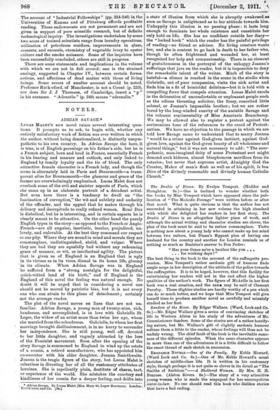NOVELS.
ADRIAN SAVAGE.*
Lucia MALET'S new novel raises several interesting ques- tions. It prompts us to ask, to begin with, whether any .-entirely satisfactory work of fiction was ever written in which the author, without being denationalized, is distinctly unsym- pathetic to his own country. In Adrian Savage the hero, it is true, is of English parentage on his father's side, but he is a French subject, born and bred in France, essentially French in his bearing and manner and outlook, and only linked to England by family loyalty and the tie of blood. The only -.attractive female character is a French lady, and though the scene is alternately laid in Paris and Stourmouth—a trans- parent alias for Bournemouth—the glamour and grace of the , former are overwhelmingly emphasized. Lucas Malet does not overlook some of the evil and sinister aspects of Paris, which she sums up in an elaborate portrait of a decadent artist. But even here there is a tendency to dwell on "the fascination of corruption," the wit and subtlety and audacity of the offender, and the appeal that he makes through his delicacy and decrepitude to really refined women. Rene Das is diabolical, but be is interesting, and in certain aspects he is clearly meant to be attractive. On the other hand the purely English types in the story—as opposed to the French or Anglo- French—are all angular, inartistic, insular, prejudiced, un- lovely, and unlovable. At the best they command our respect or our pity. Where they are sound in mind and morals they are commonplace, undistinguished, stolid, and vulgar. Where they are bad they are squalidly bad without any redeeming grace of manner, or wit, or intellectual agility. The picture that is given us of England is an England that is ugly in its virtues as in its vices, dismal in its home life, gloomy in its climate. When Adrian Savage was in England "be suffered from a "strong nostalgia for the delightful, quick-witted land of his birth," and if England is the England of this novel the feeling was natural enough. No doubt it will be urged that in considering a novel one should not be moved by patriotic bias, but it is not every ”one who can attain to this plane of detachment ; certainly -not the average reader.
The plot of the novel moves on lines that are not un- familiar. Adrian Savage, a young man of twenty-nine, rich, handsome, and accomplished, is in love with Gabrielle St. Leger, the widow of an artist more than twice her age, whom she married from the schoolroom. Gabrielle, to whom her first marriage brought disillusionment, is in no hurry to surrender her independence. She is still young, well off, devoted to her little daughter, and vaguely attracted by the lure
• of the Feminist movement. Soon after the opening of the story Savage is summoned to England to wind up the estate -of a cousin, a retired manufacturer, who has appointed him co-executor with his elder daughter, Joanna Smirthwaite. Joanna is the tragic figure of the story, but Lucas Malet is relentless in divesting her of all the customary attributes of heroines. She is repellently plain, destitute of charm, tact, or experience of the world. She mistakes the courtesy and kindliness of her cousin for a deeper feeling, and drifts into _ • Adrian Savage. By Lucas Bidet (Mrs. Mary St. Leger Harrison). London : Hutchinson and Co. De..] a state of illusion from which she is abruptly awakened as soon as Savage is enlightened as to her attitude towards him. Unhappily this illusion is no passing phase : it lasts long enough to dominate her whole existence and constitute her only hold on life. She has no confidant outside her diary— the "locked book" which the reader has the painful privilege of reading—no friend or adviser. No living creature wants her, and she is content to go back in death to her father who, though he often frightened and wounded her, at least recognized her help and companionship. There is an element of gratuitousness in the portrayal of the unhappy Joanna's sufferings that jars on the reader, but it is impossible to deny the remarkable talent of the writer. Much of the story is hateful—a climax is reached in the scene in the studio when Gabrielle, out of pure compassion, visits the sick artist and finds him in a fit of homicidal delirium—but it is told with a compelling force that compels attention. Lucas Malet excels in the delineation of uncomfortable or unpleasant people such as the odious thrusting solicitor, the fussy, conceited little colonel, or Joanna's impossible brother ; but we are rather bored by the long-winded suavity of the amiable Savage and the volcanic sentimentality of Miss Anastasia Beauchamp. We may be allowed also to register a protest against the acrimonious tone of the references to the creed of Protest- antism. We have no objection to the passage in which we are told how Savage came to understand that to marry Joanna "would be a crime against God-given instinct, against God- given love, against the God-given beauty of all wholesome and natural things," but it was not necessary to add : " The sour- pedantic, man-imagined deity of some Protestant sect might demand such hideous, almost blasphemous sacrifices from its votaries ; but never that supreme artist, Almighty God the Creator, Maker of man's flesh as well as of his spirit, le ban Dieu of the divinely reasonable and divinely human Catholic C hurch."


































































 Previous page
Previous page